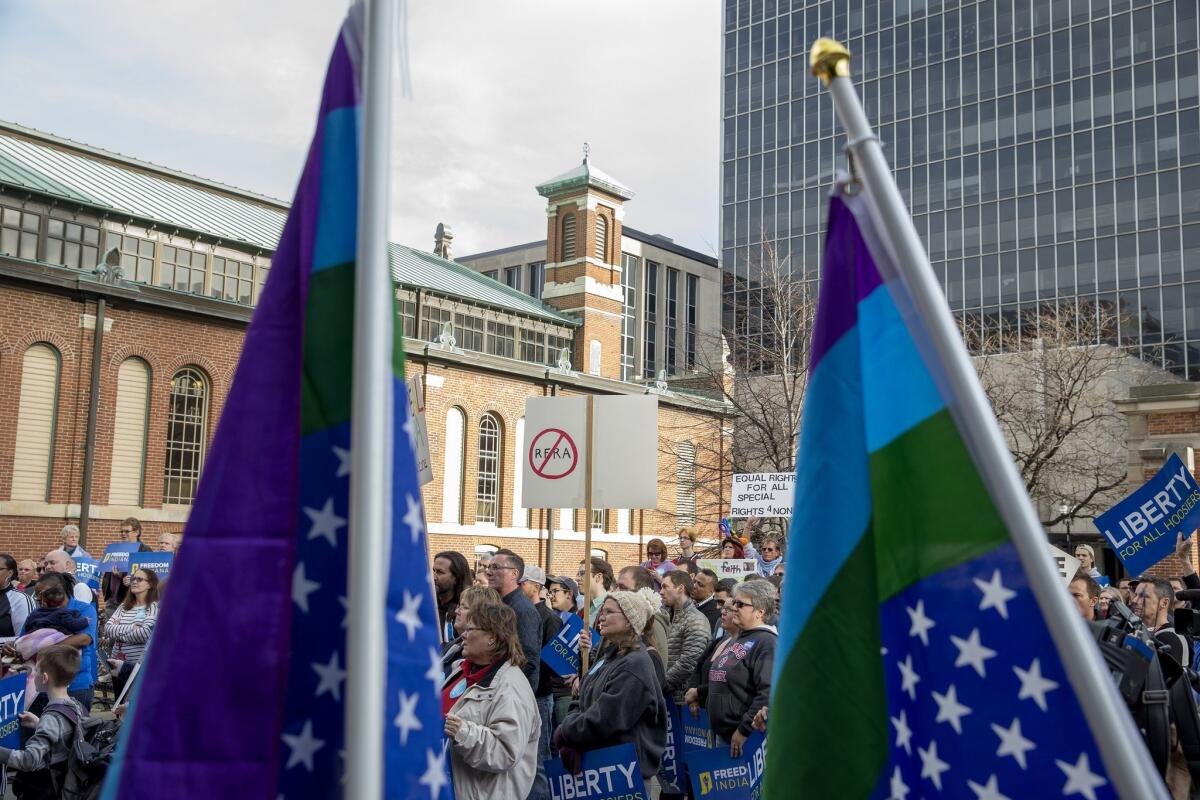Q&A:: So just what are religious freedom laws designed to protect?

Demonstrators gather in Indianapolis to urge the Indiana Legislature to roll back the Religious Freedom Restoration Act, which critics say can be used to discriminate against gays and lesbians.
- Share via
In a tumultuous week that included Big Business flexing its political muscles, lawmakers in Indiana and Arkansas walked a tightrope seeking balance between two core American values: religious freedom and protection from discrimination.
The governors of Indiana and Arkansas signed revised versions of their religious freedom laws, hoping to quiet critics who said the measures could allow discrimination.
Here is a guide for those seeking to navigate the legal thicket.
What is at stake?
In its starkest terms, the battle was between those who said they want to protect the practice of religion and those who feared that the laws could lead to discrimination against gays and lesbians. Freedom of religion is enshrined in the U.S. and state constitutions. An abhorrence of discrimination is part of the American culture, but when it comes to gays and lesbians is less securely tied to law.
Why are they in conflict now?
Both Indiana and Arkansas, conservative Republican states, passed versions of Religious Freedom Restoration Acts, laws designed to give people some legal standing if they decide their religious beliefs prevent them from delivering goods and services to potential customers.
Some Christian merchants, notably florists and bakers, have said they did not want to provide services for same-sex marriages because their religious beliefs do not condone such nuptials.
Proponents argued that the law was needed to protect religious choice, but critics said the laws would be used to discriminate against gays and lesbians.
Is this the first time this type of conflict has taken place?
No. According to Louise Melling, deputy legal director of the ACLU, religion has been invoked during times when discrimination was an issue. For example, religion was invoked by Christian schools that continued to bar African Americans during the civil rights era, arguing that Scripture called for separation of the races.
Some landlords in the past century used religion to justify not renting apartments to unmarried heterosexuals. “Pivotal moments of change often see claims involving religious objections,” she said.
So why are religion freedom laws passed?
There do not appear to be any examples of religious persecution that would have been prevented by the laws, attorneys on both sides agree. But proponents of the law argue that no examples are needed because protecting religious rights serves the interest of democracy.
“The religious freedom law is a good law,” said Kristen Waggoner, senior counselor of the Alliance Defending Freedom, which has represented people who have cited religious belief as a reason for not providing services to gays and lesbians. “It does not pick winners or losers, but allows courts to weigh the government’s and people’s interests fairly and directs judges to count the cost carefully when freedom is at stake. The new proposal unjustly deprives citizens their day in court, denies freedom a fair hearing, and rigs the system in advance.”
That may explain the religion side, but what about the discrimination claim? Are gay, lesbian, bisexual and transgender people protected from discrimination?
Sometimes they are, but more often they are not.
In federal law, there is no protected class based on sexual orientation as there is for race, religion, gender and national origin. There are some provisions safeguarding gays and lesbians in some federal laws, but the LGBT group is not generally recognized as the other groups are.
Advocates expect that issue will be fought in the coming months, especially since the battle over same-sex marriage appears to be heading for a conclusion in the Supreme Court.
But wasn’t there a federal law signed by President Clinton in 1993?
Yes. But that law, the Religious Freedom Restoration Act, doesn’t protect individual rights. That law is designed to deal with actions by governments, said John Pippa, a professor and former dean at the University of Arkansas at Little Rock law school.
The law declared that the government may not “substantially burden a person’s exercise of religion” unless it had a “compelling” reason to do so. It came in response to a 1990 Supreme Court ruling. The court ruled against Native Americans who argued that their use of peyote was a religious requirement.
Where are religious freedom laws found?
Including Indiana and Arkansas, there are 21 states with religious freedom laws. More than 20 states have laws that bar discrimination based on sexual orientation. Just four states have both. There are some municipalities that have anti-discrimination ordinances that include sexual orientation.
Many places have signs that say, “We reserve the right not to serve” people in certain situations. Is this legal?
This is a doctrine based on old English common law, and for the most part is meaningless today because of modern interpretations of discrimination laws, Pippa said. An unruly customer can be expelled, but not a class of people.
How do the anti-discrimination laws work?
If a person lives in an area with an anti-discrimination law based on sexual orientation, the person can contact the state enforcing agency, usually a human rights commission, and file a complaint. An administrative judge issues a ruling that often can be appealed in court.
If a person lives in an area without an anti-discrimination law, there is no legal recourse.
Follow @latimesmuskal for national news.
ALSO:
Hiltzik: California Endowment weighed in on Indiana--but what about other charities?
Opinion: The backlash against the backlash against Indiana’s new religious freedom law
California Journal: Two fired preschool teachers in Thousand Oaks: not Christian enough?
More to Read
Sign up for Essential California
The most important California stories and recommendations in your inbox every morning.
You may occasionally receive promotional content from the Los Angeles Times.











